高职高专实用英语教程教案unit6
大学英语综合教程1unit6教案

课时:2课时教学目标:1. 通过本单元的学习,学生能够掌握与主题相关的词汇和短语。
2. 学生能够理解并运用本单元中的语法知识。
3. 学生能够提高阅读、听力、口语和写作能力。
教学重点:1. 词汇和短语:掌握与主题相关的词汇和短语。
2. 语法知识:掌握时态、语态等语法知识。
3. 语言技能:提高阅读、听力、口语和写作能力。
教学难点:1. 词汇和短语:掌握与主题相关的难词和短语。
2. 语法知识:正确运用时态、语态等语法知识。
3. 语言技能:提高学生的综合语言运用能力。
教学准备:1. 教材:《大学英语综合教程1》2. 多媒体课件3. 教学参考书教学过程:第一课时一、导入1. 教师用英语简短介绍本单元的主题,激发学生的学习兴趣。
2. 学生自由讨论与本单元主题相关的话题。
二、词汇和短语学习1. 教师带领学生朗读并讲解本单元的词汇和短语。
2. 学生跟读,并尝试用所学词汇和短语进行造句。
三、语法知识讲解1. 教师讲解本单元的语法知识,如时态、语态等。
2. 学生跟读并练习运用所学语法知识。
四、阅读练习1. 教师指导学生阅读课文,并提出相关问题。
2. 学生回答问题,教师点评并纠正错误。
五、总结1. 教师对本节课的学习内容进行总结。
2. 学生复述本节课所学知识。
第二课时一、复习1. 教师提问,检查学生对上节课学习内容的掌握情况。
2. 学生回答问题,教师点评并纠正错误。
二、听力练习1. 教师播放听力材料,学生听后回答相关问题。
2. 教师点评并纠正错误。
三、口语练习1. 教师组织学生进行口语活动,如角色扮演、小组讨论等。
2. 学生积极参与,教师点评并纠正错误。
四、写作练习1. 教师布置写作任务,学生根据所学知识进行写作。
2. 教师点评学生作文,指出优点和不足。
五、总结1. 教师对本节课的学习内容进行总结。
2. 学生复述本节课所学知识。
教学反思:本节课通过多种教学活动,帮助学生掌握本单元的词汇、短语和语法知识,提高学生的阅读、听力、口语和写作能力。
实用英语综合教程第1册教案

实用英语综合教程第1册教案An Integrated Skills Course 1ContentsUnit1 Education (2)Unit2 Friendship (8)Unit3 Gifts (12)Unit4 Movies (18)Unit5 Our Earth (22)Unit6 Part-time Jobs (30)Unit 7 Health (36)Unit 8 Famous People (48)Unit 9 Festival (61)Unit 10 Animal Stories (73)Unit1 EducationObjectives1.Read what Bill Gates says about education;2.Build up your vocabulary relating to campus life;3.Learn something from an ancient Greek educator;4.Study different types of nouns;5.Write an introduction of yourself.Focuses1.Build up your vocabulary relating to campus life;2.Write an introduction of yourself.Outline1.Warm-up Discussion; study of words and expressions in Text A; Vocabulary Check (B and C)2.Discussion of Text A and the follow-up exercises (A and B)3.Active Words and V ocabulary Check; Grammar Tips4.Discussion of Text B and the follow-up exercises/doc/5040d052e87101f69e31955e.html prehensive Exercises (Ask the students to do the translation exercises outside of theclass beforehand)6.Practical WritingProcedures:Classroom ActivitiesI. Warm-up discussionQuestion: Do you know anything about Bill Gates such as his life and his educational background?Hint1)birthday and birthplace: October 28, 1995; Seattle, Washington2)educational background: Harvard University (education not completed)3)career: chairmen and chief software architect of Microsoft, the word‘s largest and most profitable software company.4)main events in his life:a.beginning programming computers at age 13;b.developing a version of the programming language BASIC for the first microcomputer in Harvard;c.founding Microsoft Corporation in 1975 at the age of 19II. Vocabulary in Text A1. education n.教育e.g. Children in poor areas receive free education.educate v.教育;教导educated adj.受教育的e.g. a well-educated maneducator n.教育家,教育者2. count v.派用场,点数e.g. 1) Every seconds counts.2) What counts more is whether you have tried your best.3) to count from 1 to 1004) Count these apples.3. advantage n.有利条件,好处;优点,优势e.g. This product has many advantages.advantageous adj.有利的,有益的,便利的e.g. It is highly advantageous to us.Phrase: take advantage of 很好的使用;利用e.g. take advantage of all educational opportunitiesAntonym: disadvantage n.不利;不利条件e.g. His bad health is a great disadvantage to him when he looks for work.4. lifetime n.一生,终生e.g. 1) a lifetime guarantee2)lifetime membership3) In my father‘s lifetime there have been many changes in the village.5. part-time adj.& adv.兼职的(地)e.g. 1)a part-time job2)He works part-time.full-time adj.全职的e.g. a full-time housewife6. programmer n.程序师,编程员program v.编制程序e.g. Please program the computer to do the job instead of doing it manually(手工操作).7. discourage vt. 不鼓励;使泄气,使失去信心e.g. His parents discouraged him from joining the air force.discouraged adj. 泄气的,失去信心的discouraging adj.使人泄气的,使人失去信心的e.g. 1) If you meet difficulty in your study, don‘t be discouraged.2) It is discouraging that I didn‘t k now how to solve the problem.Antonym: encourage vt.鼓励e.g. I encouraged her to work hard and to try to pass the examinations.courage n. 勇敢,勇气e.g. David showed great courage when he saved the child from the burning house.8. diploma n. 文凭,毕业证书e.g. a college diplomadiplomatic adj. 外交的,从事外交的e.g. Julia joined the diplomatic service after her graduation from university.9. project n.项目,课题e.g. 1) an impossible project2) The professor is directing a research project.Synonym: plan10. highly adv. 高度地;非常e.g. 1) a highly interesting story2) a highly paid jobPhrase: speak/ think highly of 赞扬,对…给予很高评价e.g. The leader speaks / thinks highly of our work.11. focus v.(使)集中;(使)聚焦e.g. 1) to focus (one‘s mind) in work2) All eyes focused on the speaker.focus n.(兴趣活动等的)中心,焦点e.g. Because of his strange clothes, he immediately becamethe focus of attention when heentered the office.12. range n. 范围e.g. You have a wide range of choices.range vi.在某范围内变化e.g. The temperature ranges from 10 to 20 degrees.13. attend v.参加,出席e.g. attend schoolattend a lectureattendance n.出席,到场14. automatically adv.自动地e.g. the machine operates automatically.automatic adj.自动的e.g. We have an automatic washing machine.15. drop out of 退学,不参与,退出e.g. 1) He dropped out of school at the age of 10 because his family was too poor to afford thetuition.2) She decided to drop out of the competition because it was not fire.16. chance of a lifetime 千载难逢的良机,一生中唯一的机会e.g. It‘s the chance of a lifetime. You will regret it the rest of your lif e if you don‘t take it.17. try out 试验,考验e.g. She bought a cookbook and tried out a few new recipes.18. in short 简而言之,总之e.g. In short, you should study hard for a better future.Synonym: in brief/ to sum up/ all in all/ in conclusionIII. Language Points in Text A1.They want to know what to study, or whether it?s Ok todrop out of college since that?s what I did.what to study: This is a wh-word + infinitive structure used as the object, which can be changed into an object clause. Wh-word + infinitive structure can be used as a subject, an object, or an appositive clause(同位语从句),for example:1)How to improve their English is often discussed among the students.2)We haven‘t decided when to visit the place.3)You haven‘t answered my question about wher e to get these books.it?s Ok to drop out of college: Here ―it‖ is used as a formal subject, and the actual subject is the infinitive structure ―to drop out of college‖. The general pattern is ―It is + adj. + (for/ of + sb.) todo sth.‖ More examples:1)It was very thoughtful of her to come to see me when I was ill.2)It‘s easy for me to see through his trick.that?s what I did: ―what I did‖ here is a predictive clause (表语从句)introduced by ―what‖. It is always structured in the form of ―subject + be/ look/ remain/ seem + predictive clause‖ and can be introduced by such words as ―that‖ (always omitted), and other wh-words, for example:1) It seems (that) it is going to rain.2) This is why I refused to attend the meeting.2. As I?ve said before, nobody should drop out of college unless they believe they face the chance of a lifetime.As I?ve said before: This is a non-restrictive relative clause(非限制性关系从句) introduced by ―as‖(正如…的那样), which can be placed at the beginning or at the end of the sentence. Moreexamples:1) As people expected, she was admitted to Beijing University.2) Hundreds of people were killed in the earthquake, as I have learned from the newspaper. unless: is a conjunction for an adverbial clause of condition (条件状语从句), which equals ―if…not…‖(除非).e.g. I won‘t leave unless the rain stops.3. In my company?s early years, we have a bright part-time programmer who planned to drop out of high school to work.planned to: intend to do sth.计划、打算做某事e.g. I plan to make a trip to Beijing during the summer vocation.who planned to …work: a restrictive relative clause introduced by ―who‖ since its antecedent is a person and serves as the subject in the clause. The relative pronoun ―that‖ can be used here too. More examples:1) The young man who sits there quietly is my brother.2) I don‘t like people that pry into others‘ private business.4. Having a diploma certainly helps somebody who is looking to us for a job.look to sb./ sth.: to depend on sb. or sth. for help or advice 指望,依赖e.g. We look to you for support.5. High school and college offer you the best chance to learn many things and to do projects with others that teach you about team spirit.that teach you about team spirit: This is a restrictive relative clause introduced by ―that‖, whose antecede nt acts as the subject of the clause. Actually the relative clause introduced by ―that‖ can be used to modify both the person or the thing,and the roll of ―that‖ can be either the subject or the object.e.g. He was the only one that I knew there.I haven‘t been to the place that you have mentioned.6. In high school there was a time when I was highly focused on writing software, but for most of my high school years I had many interests.when …software: This is a relative clause introduced by the relative a dverb ―when‖, which acts as the adverbial of time in the clause.e.g. 1) There was a time when I completely lost my self-confidence.2) I will never forget those days when we were together.7. For me, classroom is not the only place where you can learn.where you can learn: This is a restrictive relative clause introduced by the relative adverb ―where‖, which is used as the adverbial of place in the clause.e.g. 1) Do you still remember the restaurant where we had dinner last night?2) This is the place where he stayed his whole life.8. In short, it?s a real mistake not to take the chance to studya wide range of subjects and to learn to work with other people because education does count.it?s a real mistake not to take the chance: This is an example of a negative infinitive structure, where ―not‖ is placed before an infinitive.e.g. 1) We are asked not to speak loudly in class.2) It is a good idea not to go out on such a rainy day.IV. Focus on Grammar名词(Noun )一、名词的概念表示人、事物或抽象概念的词叫做名词。
致用英语综合教程综合英语2教案综合英语2单元设计unit6

Period One – Around the TopicPeriod Length: 50 minutesGoals-Prepare to talk about crime and security issuesPurposes-To understand vocabulary and expressions about criminal issues-Obtain background knowledge about crime and securityStep 1: Vocabulary (20 minutes)-Ask students to work on the Vocabulary on Page 86 & 87-Encourage students to think as more as possible-List these word on the board or screenStep 2: Your Ideas (30 minutes)-Work in groups to discuss the topics and questions listed on Page 86 & 87-Share in the group your ideas and opinions about crime and security-Discuss your standard about crime and justice and share your opinion about the punishment for crimes-Present the group discussion result in frontKey points-All activities be carried out in English-Inspect each group for the purpose of guidance and promotionHomeworkPeriod Length: 50 minutesGoals-Vocabulary and grammar-Discourse knowledgePurposes-Learn new words and expressions-Understand key grammar points-Understand related discourse knowledgeStep 1: Pre-reading Tasks (15 minutes)-Discuss briefly the questions on Page 89 in groups-Check briefly the preview results from studentsStep 2: Reading activity (Part One: 25 minutes)-Listen to the reading-Ask students to present new words and sentences in groups-Ask students to give feedbacks for the information presented-Give more explanations to the new words and sentences-Provide extra knowledge about new words-Guide more on sentences and grammarStep 3: Summarization (10 minutes)-Summarize the words and sentences-Summarize the text learntKey points-Instructions and tasks carried in English, Chinese is used only when necessaryHomework-Review the learnt sections-Preview the following parts and exercisesPeriod Length: 50 minutesGoals-Vocabulary and grammar-Discourse knowledgePurposes-Learn new words and expressions-Understand key grammar points-Understand related discourse knowledgeStep 1: Pre-reading Tasks (15 minutes)-Discuss briefly the previously learnt part for understanding-Check briefly the preview results from studentsStep 2: Reading activity (Part Two: 25 minutes)-Listen to the reading-Ask students to present new words and sentences in groups-Ask students to give feedbacks for the information presented-Give more explanations to the new words and sentences-Provide extra knowledge about new words-Guide more on sentences and grammar-Check the comprehension questions on Pages 90 & 91Step 3: Summarization (10 minutes)-Summarize the words and sentences-Summarize the text learntKey points-Instructions and tasks carried in English, Chinese is used only when necessaryHomework-Review the learnt sections-Preview the following parts and exercisesPeriod Length: 50 minutesGoals-Enhance the vocabulary abilityPurposes-Learn detailed usage of certain words-Learn detailed usage of certain language structuresStep 1: Exercise A (15 minutes)-Work Vocabulary and Structure exercise A on Page 92 in groups -Check and compare answers in groups and negotiate them-Ask students to present their answers-Provide feedbacks for answersStep 2: Exercise B (15 minutes)-Work exercise B on Page 93 in groups-Check and compare answers in groups and negotiate them-Ask students to present their answers-Provide feedbacks for answersStep 3: Exercise C (20 minutes)-Work exercise C on Page 93 in groups-Check and compare answers in groups and negotiate them-Ask students to present their answers-Provide feedbacks for answersKey points-Instructions and activities be carried in EnglishHomework-Finish Writing Task on Page 93 and turn them in due next period -Prepare for the grammar and vocabulary exercisesPeriod Five – Language in UsePeriod Length: 50 minutesGoals-Grammar knowledge and vocabulary buildingPurposes-Modal verbs expressing possibility / probability-Compound Words 3Step 1: Modal Verbs Expressing Possibility / Probability (30 minutes) -Test grammar knowledge on Page 94 for checking grammar abilities-Work on exercises A, B & C on Pages 94 & 95 in groups-Ask students to present their answers and provide necessary explanations -Give supplementary information on those structures if necessaryStep 2: Compound Words 3 (20 minutes)-Work on exercises A & B on Pages 28 in groups-Ask students to present their answers and explain Compound words-Give supplementary information on Compound words if necessaryKey points-Give instructions in English-Explain grammar knowledge in ChineseHomeworkPeriod Six – Extension: Computer CrimePeriod Length: 50 minutesGoals-Extend reading abilitiesPurposes-Apply previously learnt vocabulary and cultural knowledge in reading-Develop reading abilities-Improve abilities on negotiation and discussionStep 1: Reading (20 minutes)-Ask students to read Computer Crime on Page 97 in groups-Understand new words and sentences within the group by negotiating in English -Finish Understanding Check on Page 99Step 2: Discussion (30 minutes)-Finish Blank Filling exercises on Page 99-Discuss the theme of the reading material and share your opinion on computer crime-Ask each group to present their opinions for the questions in front-Give feedbacks and remarks for presentationsKey points-Inspect group discussions and give guidance to promote discussionsHomework-Review previously learnt materials-Prepare for the Project‘Neighbourhood Watch’Period Length: 50 minutesGoals-Teamwork abilitiesPurposes-Apply previously learnt words and cultural knowledge into actual use-Develop teamwork abilitiesStep 1: Brainstorming (25 minutes)-Students work in groups to brainstorm a situation that you are going to investigate-Students work in groups to brainstorm for ideas about what to investigate with reference to Page 96Step 2: Discussion (25 minutes)-Ask students to work in pairs or groups to discuss your ideas and exchange opinions for your ideas-Put ideas down on a piece of paper for referenceKey points-All preparations and negotiations be carried in English-Give guidance while students prepare the projectHomework‘Neighbourhood Watch’Period Length: 50 minutesGoals-See abovePurposes-See aboveStep 1: Drafting (25 minutes)-Structure a questionnaire by rearranging the ideas and item according to different aspects of investigation based on the brainstorming.-Design your questionnaireStep 2: Presentation (25 minutes)-Each student present his questionnaire to the whole class-Give remarks to the presentations-Every student should also talk about what they have learnt from this questionnaire project.Key points-Give instructions for discussionHomework-Revise the questionnaire according to the feedbacks and remarks received-Turn the revised copies before next periodPeriod Nine – Culture TipsPeriod Length: 50 minutesGoals-Understand part of western culture from another perspectivePurposes-Help students to understand western culture-Help students to learn more cultural expressionsStep 1: Warm-up (15 minutes)-Read materials about the suggestions on against crime on Page 32-Help on any new words if necessaryStep 2: Open Discussion (35 minutes)-Ask students to offer more stories related to the topic-Encourage students to pay more attention to the crimes that may happen around the corner of the street or just next to you-Ask more suggestions on against crimeKey points-All activities be carried in EnglishHomeworkPeriod Ten – Learning to Learn Period Length: 50 minutesGoalsPurposesStep 1Step 2Key pointsHomework。
综合英语教程(第三版)5电子教案unit6section3

?
7. Good families are affectionate. This is of course a matter of style. A handshake or a hug is sign of affection for each other. Regardless of age, everyone needs to be hugged and comforted in a brotherly or sisterly way now and then. Preferably now.
KEYS
?
Group discussion Work in small groups to discuss these questions in order to prepare for your research. 1. What akes someone in the family a chief, or a heroine? 2. Why is the role of a switchboard operator assumed
3. Good families are much to all their members, but everything to none. Good families are fortresses with many windows and doors to the outer world. … Parents are devoted to what they do outside as they are to each other and their children. Their curiosity and passion are contagious. Everybody, where they live, is busy. Paint is spattered on eyeglasses. Mud lurks under fingernails. Person-to-person calls come in the middle of the night from Tokyo and Brussels. Catcher’s mitts, ballet slippers, overdue library books, and other signs of extra-familial concerns are everywhere.
新编英语教程6Unit 6 Black English
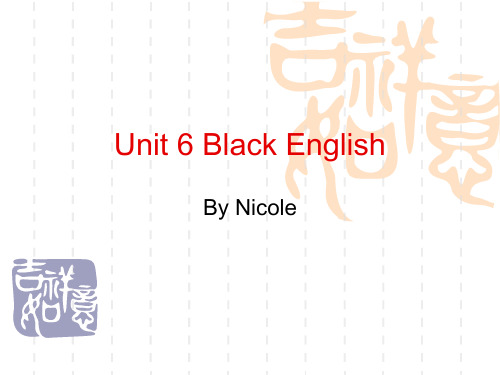
Learn the PPTs about Black English
STRUCTURE
Main idea: To present the author’s opinion on the status of Black English.
What is the author’s opinion?
Para. 1
Main idea Line 4: He speaks a dialect that has a strikingly different grammar and sound system, even though to white ears the black appears to be trying to speak SE.
inferior
Less important; not as good as (quality) (1) He preferred the company of those who were intellectually inferior to himself. 他喜欢与那些智力水平不如他的人共处。 (2) ...the inferior status of women in prerevolutionary Russia... 革命之前俄国妇女的低微地位 (3) Most career women make me feel inferior. 大部分职业女性让我感到自己不如她们。
Line 6- 9
Stigmatize: (stigma [ n.]) If someone or something is stigmatized, they are unfairly regarded by many people as being bad or having something to be ashamed of. Children in single-parent families must not be stigmatized. 单亲家庭的孩子们不应该受到歧视。 The AIDS epidemic further stigmatized gays. 艾滋病的流行让人们更加瞧不起男同性恋者。 They are often stigmatized by the rest of society as lazy and dirty. 他们经常被社会中的其他人污蔑为懒惰、肮脏。
新标准高职公共英语实用综合教程(第二版)unit6TextA精品PPT课件

Hints
In aspects(['æ spekt] 方 面 )of thinking, values, living habits and so on.
《实用综合教程(第二版)》第2册电子教案
Unit 6 Generation Gap
《实用综合教程(第二版)》第2册电子教案
Unit 6 Generation Gap
Listening and SpeLaistkeniingng Speaking
I. Listening (P.106,107) A. Choose the best answer according to what you hear.
Warm-up Background Information Discussion
Questions: (P.106) (2) If you have different ideas from your parents, what do
you do to bridge the gap?
Hints
I will talk to them, telling them how and why I think in a different way. Meanwhile, I’ll listen to their voices, trying to put myself in their position.
《实用综合教程(第二版)》第2册电子教案
Unit 6 Generation Gap
Warm-up Background Information Discussion
Generation Gap([dʒenə'reɪʃən]代沟) (P.107) In modern society, there is often a lack of
英语(高职高专英语专业)(第二版)综合教程2电子课件PPT Unit6
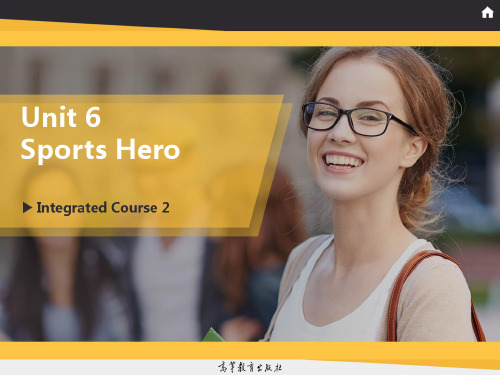
Unit 6 Sports Hero
Jordan’s father was murdered during a robbery in 1993, and this tragic event partially led to Jordan’s temporary retirement from basketball that same year. He tried baseball, which he stuck with until 1995 when he returned to the NBA. He played a part in the movie “Space Jam” during the off season of his first year back in the NBA.
In 1984, he left UNC after his junior year to play in the NBA when the Chicago Bulls drafted him. He was the third pick of the first round. In 1985, he was named rookie of the year. In 1991 Michael Jordan won his first of six NBA championships. The next year he won a gold medal in the Barcelona Olympics. During the off season, he returned to UNC to finish his Bachelor of Arts degree.
Unit 6 Sports Hero
Michael Jordan is my hero for many reasons. He was a great basketball player. In his busy schedule, he always found time to give back. He was not greedy with his money. He always worked hard at everything that he did. He was very determined and never gave up. He always found a way to triumph in any situation. He always found time to spend with his family. All of these things make him one of the greatest heroes of all time.
王守仁主编-高职高专实用综合教程unit1-6教案

4. Over the years, out of sense of respect, Iimagine, I have refused to trouble women with outdated courtesies: I think I have been consciously avoiding treating women with old-fashioned courtesies all these years, simply because I respect them.
Use first names or nicknames among friends;
Use “Mr., Mrs. Or Miss X” foracquaintances or someone one wants to show respect to;
Use “Sir” or “Madam” to address strangers.
在历史上从历史角度看historical历史上的有关历史的historicallessons历史教训historic有历史意义的历史上有名的ahistoricmeeting历史性会议historian历史学家从事历史研究的人4
王守仁主编-高职高专实用综合教程unit1-6教案
大学英语
实用综合教程教案
Use first names among people on close terms with each other;
中职《英语基础教程》第一册Unit6-1
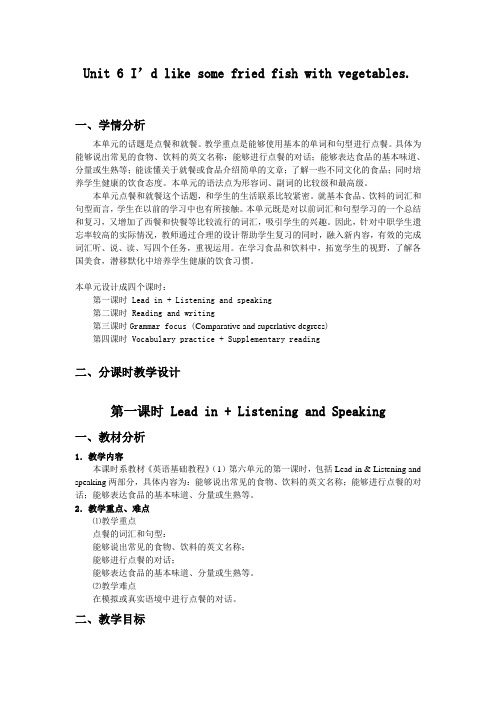
Unit 6 I’d like some fried fish with vegetables.一、学情分析本单元的话题是点餐和就餐。
教学重点是能够使用基本的单词和句型进行点餐。
具体为能够说出常见的食物、饮料的英文名称;能够进行点餐的对话;能够表达食品的基本味道、分量或生熟等;能读懂关于就餐或食品介绍简单的文章;了解一些不同文化的食品;同时培养学生健康的饮食态度。
本单元的语法点为形容词、副词的比较级和最高级。
本单元点餐和就餐这个话题,和学生的生活联系比较紧密。
就基本食品、饮料的词汇和句型而言,学生在以前的学习中也有所接触。
本单元既是对以前词汇和句型学习的一个总结和复习,又增加了西餐和快餐等比较流行的词汇,吸引学生的兴趣。
因此,针对中职学生遗忘率较高的实际情况,教师通过合理的设计帮助学生复习的同时,融入新内容,有效的完成词汇听、说、读、写四个任务,重视运用。
在学习食品和饮料中,拓宽学生的视野,了解各国美食,潜移默化中培养学生健康的饮食习惯。
本单元设计成四个课时:第一课时 Lead in + Listening and speaking第二课时 Reading and writing第三课时Grammar focus (Comparative and superlative degrees)第四课时 Vocabulary practice + Supplementary reading二、分课时教学设计第一课时 Lead in + Listening and Speaking一、教材分析1.教学内容本课时系教材《英语基础教程》(1)第六单元的第一课时,包括Lead-in & Listening and speaking两部分,具体内容为:能够说出常见的食物、饮料的英文名称;能够进行点餐的对话;能够表达食品的基本味道、分量或生熟等。
2.教学重点、难点⑴教学重点点餐的词汇和句型:能够说出常见的食物、饮料的英文名称;能够进行点餐的对话;能够表达食品的基本味道、分量或生熟等。
新编实用英语综合教程1-unit 6-教案
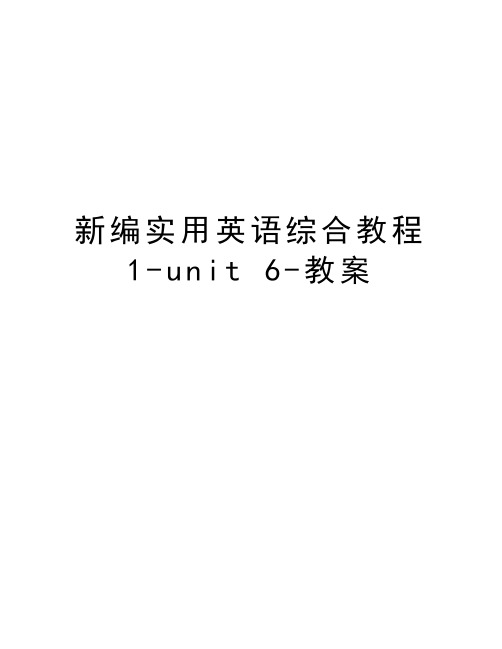
新编实用英语综合教程1-u n i t6-教案
用心整理的精品word文档,下载即可编辑!!
教案首页
精心整理,用心做精品1
用心整理的精品word文档,下载即可编辑!!
课堂组织
教案内容
精心整理,用心做精品2
用心整理的精品word文档,下载即可编辑!!
精心整理,用心做精品3
用心整理的精品word文档,下载即可编辑!!
精心整理,用心做精品4
用心整理的精品word文档,下载即可编辑!!
教案首页
精心整理,用心做精品5
用心整理的精品word文档,下载即可编辑!!
课堂组织
精心整理,用心做精品6
用心整理的精品word文档,下载即可编辑!!
教案内容
精心整理,用心做精品7
用心整理的精品word文档,下载即可编辑!!
精心整理,用心做精品8
用心整理的精品word文档,下载即可编辑!!
精心整理,用心做精品9
教案首页
课堂组织
教案内容
教案首页
课堂组织
教案内容。
高职国际进阶英语综合教程1 Unit6 课后习题答案

√a. when I first meet them.
b. when I know them.
2 Most people ... a. don’t know what to say.
√b. don’t know if they have a hobby.
1. Most people have at least two hobbies.
True False Not mentioned
✓
2. You always sleep after a game of volleyball.
✓
3. Bungee jumping is cheaper than skydiving.
3 Hobbies ...
√a. take a lot of time.
b. cost a lot of money.
Text A
After-reading Exercises
Looking at the text 2 Choose the best answer to complete each sentence.
4 You ... a lot of hobbies at the same time. a. must do
√b. can do
5 If you are fit, ... a. you can only do extreme sports.
√b. you can do extreme sports, too.
7 You can go jogging ... a. all the time.
√b. any time you want to.
新标准高职公共英语实用综合教程(第二版)unit6

《实用综合教程(第二版)》第2册电子教案
Unit 6 Generation Gap
Background Information
Discussion
Questions: (2) If you have different ideas from your parents, what do you do to bridge the gap?
Listening
Speaking
B. Fill in the blanks of the following passage according to what you hear
Some people think that today the generation gap is becoming wider and wider, but this may not be (1) true ___ . The problem remains the same: the young need to find their (2) place ____ in life. To better understand your daughter, try to remember how you (3) ___ felt at her age. Probably you also worried about how you lived among your friends. You compared yourself with others in your
《实用综合教程(第二版)》第2册电子教案
Unit 6 Generation Gap
Background Information
Unit 6 Olympics and Sports 新编实用英语综合教程 电子教案 授课计划 教学设计

Unit | Six
Script: Bob: Look, Xiao Li. What a clear day! Xiao Li: Yes, it looks very nice. A good day for outdoor activities. Bob: Right. And it will be good for us to spend time outdoors. What do you feel like doing exactly? Xiao Li: I haven't made up my mind yet. What do you think? Bob: How about a bicycle ride to the lake area? Xiao Li: Good idea! Let's take a ride through the woods. Bob: Yeah! It would be so nice to take in the beauty of nature. Xiao Li: Yes, indeed. We'd better go slowly so that we can see more of the view. Bob: And we can take deep breaths of the fresh air. Xiao Li: Now let's see what we should bring with us. Swimming suits? Bob: No, the water might be cold by now. Just some food and drinks. Oh, yes, and perhaps the barbecue grills. Xiao Li: Barbecue grills? All right. With them we can have a good picnic by the lake. Back Bob: And how about the fishing rod and fishing line?
大学体验英语综合教程-unit6

话题讨论
给出一些热门话题或观点, 让学生进行讨论或辩论, 训练学生的思辨能力和口 语表达能力。
故事复述
听一段简短的故事或对话, 然后要求学生用自己的话 复述出来,以提高学生的 口语流利度和记忆力。
05
Summary and Reflection
Learning difficulties and problems
Difficulties
Some of the exercises in this unit were quite challenging, especially those that required me to write essays with a strong analytical component.
Students will complete assigned readings, write essays, and practice
vocabulary and grammar skills.
Group work
Students will work in groups to complete tasks and exercises related to the topic.
Course outline
Unit 2
Essay Writing Skills
Unit 4
Vocabulary and Grammar Skills
Unit 1
Critical Thinking and Reading Comprehension
Unit 3
Technical Writing Skills
THANKS
感谢观看
段落大意匹配
提供一段长文,要求学生匹配每个段落的大意和对应的段落位置。
最新版创新高职英语基础教程实用2册精品电子教案unit 6 Yes, High Technology, but Wait!Part B

B2 Read.
Deteriorating sleep patterns
Back pain
Headache
Hearing problems
B2 Read.
Eye problems
Neck strain/injury Laziness & Obesity
Knee pain
Carpal tunnel syndrome (腕管综合征)
B1 Look and say.
Telephone was replaced by Mobile phone Television is getting thinner . Meanwhile people are getting bigger
Instead of waiting nervously for the phoneห้องสมุดไป่ตู้call, people nowadays can contact with each other on Twitter or QQ in front of the computer.
B2 Read. Read
The Social Problems Being Caused by TECHNOLOGY
Lead-in activity Guided reading After-reading reflection Resources
B2 Read.
Lead-in activity Questions for discussion (open): 1. Among the following ways of communication, which one do you prefer? Why?
B2 Read.
外研社职场实用英语交际教程(高级)教学课件VETS高级PPT_Unit_6

Scenario
Career tip
顾客忠诚计划(customer loyalty programme)指企业对于顾客频繁的重复购 买行为提供的优惠或增值服务,其目的在于奖励忠诚顾客、刺激消费并留住 核心顾客,是实施关系营销的一种重要方式。
职场实用英语交际教程(高级)——Unit 6
programme and market research, including the programme’s purposes, incentives, and customers’ characteristics; • list two to three key points you need to consider when making a customer loyalty programme; • report a customer loyalty programme.
budgets.
职场实用英语交际教程(高级)——Unit 6
职场实用英语交际教程(高级)——Unit6
Unit Outline
Scenario Set the task Prepare for the task Develop the strategies Fulfil the task To extend
职场实用英语交际教程(高级)——Unit 6
Scenario
Set the task
Understand the text
1. Listen to the conversation and choose the best answer.
What does Louise ask Kevin to do?
C
新编实用英语综合教程1-unit 6-教案
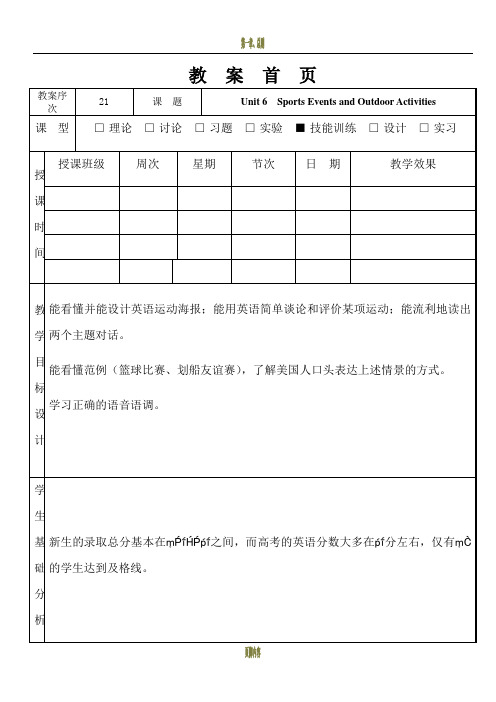
然而这方面我从未有很多困难。跟我交谈过的中国人总是说我的发
音很地道。
页脚内容
第一章、总则
我知道他们只是在说客气话而已。
:
即将成 为
结果我们激烈争论起来
页脚内容
第一章、总则 …
’
很多学生被网络游戏所吸引。
他 们 迟 早 会 认 识 到 保 护 环 境 的 重 要 性 。
学习正确的语音语调。 设 计
学 生 基 新生的录取总分基本在之间,而高考的英语分数大多在分左右,仅有 础 的学生达到及格线。 分 析
页脚内容
第一章、总则
教 本次课为第二单元听说课。对话中涵概了表达体育运动和户外活动情景时,常用的
材 交际语。听力短文为一篇介绍美国人喜欢户外烧烤的文章。参看学生练习册
择
重
点
难
点
分
析
页脚内容
教
具
选
用
第一章、总则
页脚内容
第一章、总则 课堂组织
Ⅲ
主 :
板 书
设
计
知 序号
知识点
识
点
及
时
间
分
配
时间
作
第一章、总则
其结果是以而告结束
结果是我多骑了公里的自行车。长跑时我哭了一路。
糟糕的是我没有同龄选手可以一起训练。她说。那可真是 好笑。
页脚内容
第一章、总则
根据一份报告统计,每个美国人中就有一个人曾经练过或者正在
练习某一流派的武术。
作
计划布置
业 ,
布
置
实际布置 ,
课
后
自
评
教学提示
《 新生代英语高级教程2》教案unit6

课程名称新生代英语高级教程2课时班级专业教师系部教研室教材《新生代英语高级教程2》补充教学资源Vocabulary Builder参考译文男:我有跟你说我的新爱好吗?女:没有,是什么?男:我开始对摄影感兴趣了。
女:摄影?什么类型的?男:其实,我喜欢给食物拍照片。
女:食物?听着有些无聊。
男:不!其实这非常酷。
我去餐馆给我点的食物拍照。
然后我把照片发布在我的博客上,并点评这些食物。
女:哦,所以这些照片是用来写餐馆评论。
有点意思……博客叫什么名字? 男:叫作“吃喝在纽约”。
你可以用谷歌搜索一下。
女:我会的!期待看你发布的文章。
Show Time 参考译文语言解析1.We take turns asking questions.我们轮流回答问题。
take turns: if two or more people take turns doing work,using something etc, they do it one after the other, for example in order to share the work or play fairly 轮流,依次;后可接动词ing或to do形式e.g. The students were taking turns Reading aloud.学生正在轮流朗读。
Dan and I usually take turns to cook.我和丹通常轮流做饭。
2.Well,let's start with Geography,because that's my specialty.好的,让我们先从地理开始,因为这是我的长项。
specialty: n.a subject or job that you know a lot about or have a lot of experience专长,专业e.g.Johnson's specialty is medieval European history.约翰逊的专业是中世纪欧洲史。
- 1、下载文档前请自行甄别文档内容的完整性,平台不提供额外的编辑、内容补充、找答案等附加服务。
- 2、"仅部分预览"的文档,不可在线预览部分如存在完整性等问题,可反馈申请退款(可完整预览的文档不适用该条件!)。
- 3、如文档侵犯您的权益,请联系客服反馈,我们会尽快为您处理(人工客服工作时间:9:00-18:30)。
高职高专实用英语教程教案U n i t6-CAL-FENGHAI-(2020YEAR-YICAI)_JINGBIANUnit 6 HobbiesLecturer: Cai JieTeaching Objectives:Students (Ss) will be able to:Have a deeper understanding about different shopping behavior of men and women.Mastering the key language points and grammatical structures in the text.How to talk about one’s hobbies.Master the Grammar of TensesTranslating skill:Translation of TensesWriting and replying to Invitation Letters.Teaching Focus:Vocabulary: enrich, be crazy about doing, assistant, in stock, promptly, proceeds, lightly, substitute, persuade, patience, opposite, companion, in advance, to one’s satisfaction,base…on / upon, in every respect, make up one’s mind, strength, exactly, poverty, go back to liquid, estate, suffer from, be equal to, before long etc.How to talk about one’s hobbies.Master of the grammar of TensesTime Allotment:1st period2nd period3rd-4th periods5th-6th periods7th-8th periodsWarming-up Act ivities; Listening and Speaking Pre-reading, While-reading, Text structureanalysis; further understandingStudy for language points;group discussion, exercise checkingSummary of reading; Stylistic comments; check exercise; FurtherreadingFurther reading/translation exercise/writing PracticeTeaching Methods:ExplanationGroup discussionQuestions and answersMulti-mediaPerformanceTeaching Procedure:1st Period1. Warming up for the new class:What do you enjoy doing the mostAre your hobbies good for your work or health Try to explain.3.SpeakingDividing the students into groups of four or fiveTask 1Ask the students to work in groups and practice sample dialoguesTalk about your favorite outdoor activities with your partner.Talk about one of your favorite movies with your partner.Talk about one of your favorite sports with your partner.Ask the students to work in groups to1) Understand the short dialogues on Page 121-122 of the Textbook2) To act outTask 2Work in pairs and make a short dialogue based on the information given below. My HobbiesListening to pop songs sung by…Listening to famousHow to Enjoy My HobbiesListening to the radioListening to an MP3 playeAct out in front of the class4Focus on Listening1) Word tips:prefer宁愿,更喜欢prefer sth.prefer sth. above all othersprefer A to Bprefer doing A to doing Bprefer to do sth.prefer doing sth.prefer to do sth. rather than do sth.prefer+that-clauseenrich v. to improve the quality of something by adding something elsee.g. Reading can enrich your mind.e.g. I have more time to enrich myself/learn more.be crazy about doing sth. 为……疯狂e.g. The boy has been crazy about computer games for a year.2) Finish the exercise of listening comprehension on page 124-1252nd Period1. Lead-in story:Is there any gender difference in the shopping behaviors of men and women?Give students a short video of FIVE minutes to talk about the different habits of men and women, and ask students to discuss the differences after watching it.2. Intensive Reading (Text A) Pre-reading:After the lead-in story and questions, the teacher asks the students to look at the theme of Text A and try to answer the questions as follow:1. Do men and women have the same experience when they shop?2. What do you usually buy while shopping?3. What is your mother’s shopping beha vior?3rd– 4th Periods1.Warming-up Activities:Ask some students to share their oral passage with the whole class.1. shopping for clothes is the same experience for a man as it is for a woman, isn’t it?2. Why does a man go shopping?3. Why can a man simply walk into a shop and ask the assistant for what they want?4. “If the shop has it in stock, the salesman promptly produces it.” In this sentence, what does “produce” mean?5. What does the name “salesman” imply?6. What is a woman’s shopping based on?7. Does a woman buy clothes in haste?8. Why do the husbands just wait but not involve in their wives’ shopping?2. While-reading (Text A)1) Text OrganizationAfter scanning the whole text, students are required to find the top sentences of each paragraph. And try to divide the text into 3 parts and summarize the main idea of each part.Part 1 (Para 1-2): Men’s shopping behavior. A man goes shopping because he needs something. Part 2 (Para 3): Women’s shopping behavior. A woman goes shopping often for leisure instead of buying what they need.3). Language pointsExplain the difficult words and sentences, including language and grammatical points.Focus:in advance: before a particular time, or before doing a particular thinge.g. If you’re going to c ome, please let me know in advance.e.g. They finished the task in advance.e.g. Is it cheaper if we buy our tickets in advanceconsideration [U]. when you think about something carefullye.g. The whole matter needs careful consideration.take sth. into consideratione.g. Time factor is what we must first take into consideration.in stock 有现货,有存货e.g. We don't have the book in stock but we can order it.in store 贮藏着;准备着, 将要发生promptly: quickly, without delaye.g. We’ll have to leave fairly promptly if we want to catch that train.e.g. So that we can promptly help you to solve the problem!proceed v. to continue as plannede.g. The work is proceeding according to plan.proceed to do…e.g. She sat down and proceeded to tell me about her skiing holiday.proceed with sth.e.g. Please proceed with what you are doing.e.g. Tell us your name and then proceed with your story.proceed from …e.g. All these evils proceed from war.in this/that case 既然这样/ 那样,假若这样/ 那样e.g. In this case, price is an important consideration.in no case无论如何不,决不in the case of至于……,就……来说in case假使;免得,以防万一in any case无论如何,不管怎样in some/many/most cases一些/许多/大部分情况下imply v. to communicate an idea or feeling without saying it directlye.g. His silence implied agreement.e.g. I think freedom does imply responsibility.substitute n.代用品,替补;代替者, v.代替substitute A for Be.g. The coach substituted Smith for Jones.substitute teacher / doctorin every respect在每一个方面in this respect 在这点上e.g. In his respect, they indeed played a critical role in this event.in respect of 关于,涉及e.g. We reviewed China’s progress of the previous year in respect of economic growth and cultural development.base on … / upon把……建立在某种基础上, 基于be based ... on/upone.g. I base my conclusion on facts.e.g. My conclusion is based on facts.e.g. A good marriage is based on trust.e.g. Teaching is an art based on a science.make up one’s mind (to do) 下定决心e.g. I made up my mind to study harder.e.g. Once she has made up her mind, nothing can change it.make u p one’s mind that …e.g. She made up her mind that, no matter what happened, she would stay there.change your mind 改变主意bear/keep sb/sth in mind牢牢记住cross/enter sb’s mind 想起来,想过be out of one’s mind 发疯了bring/call sth to mind 回想起来companion n. a person who is frequently in the company of anothere.g. They’re drinking companions.companionable adj. 友善的company n. v. 陪伴in company with 连同,一道e.g. I, in company with many others, feel this decision was wrong.in the company of与 ... 一起e.g. It is in the company of such music that I feel most at home.apparently adv. used when the real situation is different from what you thought it wase.g. She looks about 10 but apparently she’s 14.e.g. But apparently time has not solved any of our problems.something seems to be true, although it is not certaine.g. Beneath that apparently calm surface is a man of bad temper.4) Explain some difficult sentences, encourage students paraphrase some sentences.4. Post-reading ExercisesReading comprehension exercises (see textbook P129-131)5AssignmentReview the phrases and expressionsTry to retell the Reading Text A5th– 6th Periods1.Lead-inAsk several students to retell the Reading Text A.2.Extensive Reading Text B1)Pre-reading:discussionStudents are required to discuss the topics in a group of four or five,Do you like drinking tea?Do you know how many kinds of tea are there in ChinaGreen Tea / Black Tea / Oolong Tea / Brick Tea / Scented TeaGive a brief instruction about the afternoon tea in Britain. And showing a short film about ten minutes about the afternoon tea in Britain.2) While-reading: Scanning1. Scanning and find these statements True or FalseT 1. This passage tells the reader what part tea plays in British people’s life.T 2. “To take some slight refreshment” means to drink some tea and eat some cakes to bring back one’s strength and energy.T 3. The English custom of afternoon tea has been observed for over two hundred years.F 4. In fact, the English custom of afternoon tea, it is said, goes back to the early eighteenthcentury.T 5. Today Englishmen drink more tea than any other nation.F 6. Tea only grows in warm countries. The British first heard of tea in 1598.F 7. In Britain tea is very expensive.F 8. Life is far from cheerful for many of those who produce tea in other parts of the world.3) Explain some key words and language points in Text B.customary: usual, traditional adj.习惯的;通常的e.g. In my village, it is customary for a girl to take her mother’s name.go back to 返回到,追溯到e.g. It’s a tradition that goes back at least 100 years.suffer from: v. to experience physical or mental paine.g. Our town suffered from floods last year.e.g. She suffers from headaches.e.g. All over the world many people still suffer from hunger .bring back拿回来;使…恢复;使…回忆起来e.g. This win will bring back our long lost confidence.e.g. Warm home may bring back our sense of safetybring back to memory / bring back to one’s mindaverage n.平均数,平均;一般水平,中等水平e.g. The boy’s work at school is above (the) average.e.g. The average age of the boys in this class is fifteen.be well (quite) up to the average 完全达到一般水平below the average 在一般水平(或平均数)以下on (the) average 按平均值,平均来说,平均起来,一般说来;通常[亦作on an average]in times of 处于…时刻,正当…时in times of trouble患难时期,困难时期in times of war / crisis / prosperity / peace / dangerdeal in: to buy and sell particular goods as a businesse.g. We deal in hardware but not software.e.g. I’ve dealt in motorcars for twenty years.poverty n. the condition of being extremely poore.g. The novel shows a surprising poverty of imagination.e.g. The real poverty is ignorance, not want of money.poverty gap / level / linebe equal to 相等的,相同的, 胜任e.g. The task took quick thinking, but John was equal to it.e.g. Helen is quite equal to Jack in brains.before long : soonlong before: long agoe.g. Long before, there was a big museum.e.g. I hope I can write to you before long.AssignmentReview the phrases and expressions \7th –8th Periods1.Post-reading of Text BDo the exercises and check the answers. (133-134)2.Translation Skills: (Tenses)3Writing: (Invitation Letters)1) Explanation of Leave-taking Memo or Notes邀请信有两种形式:正式邀请信和非正式邀请信。
